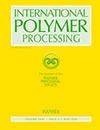在注塑成型周期早期预测零件质量
IF 1.9
4区 工程技术
Q4 ENGINEERING, CHEMICAL
引用次数: 0
摘要
摘要 在注塑成型过程中,基于数据的过程监控在补偿过程干扰和相关零件质量损害方面发挥着重要作用。基于机器学习方法,为成功的在线质量预测选择合适的特征至关重要。注塑压力和注塑流量曲线等时间序列尤其适用于这一目的。在一个周期内尽早预测质量具有很多优势。本文展示了在使用机器学习算法时,时间序列的记录长度如何影响预测性能。为此,在大量数据集上使用不同长度的时间序列对两种成功的成型质量预测算法(k Nearest Neighbors 和 Ridge Regression)进行了训练。评估了它们对零件重量和几何尺寸的预测性能。评估结果表明,要获得良好的预测结果,并不需要在一个周期结束前记录时间序列。这些研究结果表明,在一个周期内进行早期可靠的质量预测是可能的,这样可以加快预测速度,在周期结束时及时处理零件,并为同一周期内的自动纠正干预提供依据。本文章由计算机程序翻译,如有差异,请以英文原文为准。
Predicting part quality early during an injection molding cycle
Abstract Data-based process monitoring in injection molding plays an important role in compensating disturbances in the process and the associated impairment of part quality. Selecting appropriate features for a successful online quality prediction based on machine learning methods is crucial. Time series such as the injection pressure and injection flow curve are particularly suitable for this purpose. Predicting quality as early as possible during a cycle has many advantages. In this paper it is shown how the recording length of the time series affects the prediction performance when using machine learning algorithms. For this purpose, two successful molding quality prediction algorithms (k Nearest Neighbors and Ridge Regression) are trained with time series of different lengths on extensive data sets. Their prediction performances for part weight and a geometric dimension are evaluated. The evaluations show that recording time series until the end of a cycle is not necessary to obtain good prediction results. These findings indicate that early reliable quality prediction is possible within a cycle, which speeds up prediction, allows timely part handling at the end of the cycle and provides the basis for automated corrective interventions within the same cycle.
求助全文
通过发布文献求助,成功后即可免费获取论文全文。
去求助
来源期刊

International Polymer Processing
工程技术-高分子科学
CiteScore
2.20
自引率
7.70%
发文量
62
审稿时长
6 months
期刊介绍:
International Polymer Processing offers original research contributions, invited review papers and recent technological developments in processing thermoplastics, thermosets, elastomers and fibers as well as polymer reaction engineering. For more than 25 years International Polymer Processing, the journal of the Polymer Processing Society, provides strictly peer-reviewed, high-quality articles and rapid communications from the leading experts around the world.
 求助内容:
求助内容: 应助结果提醒方式:
应助结果提醒方式:


